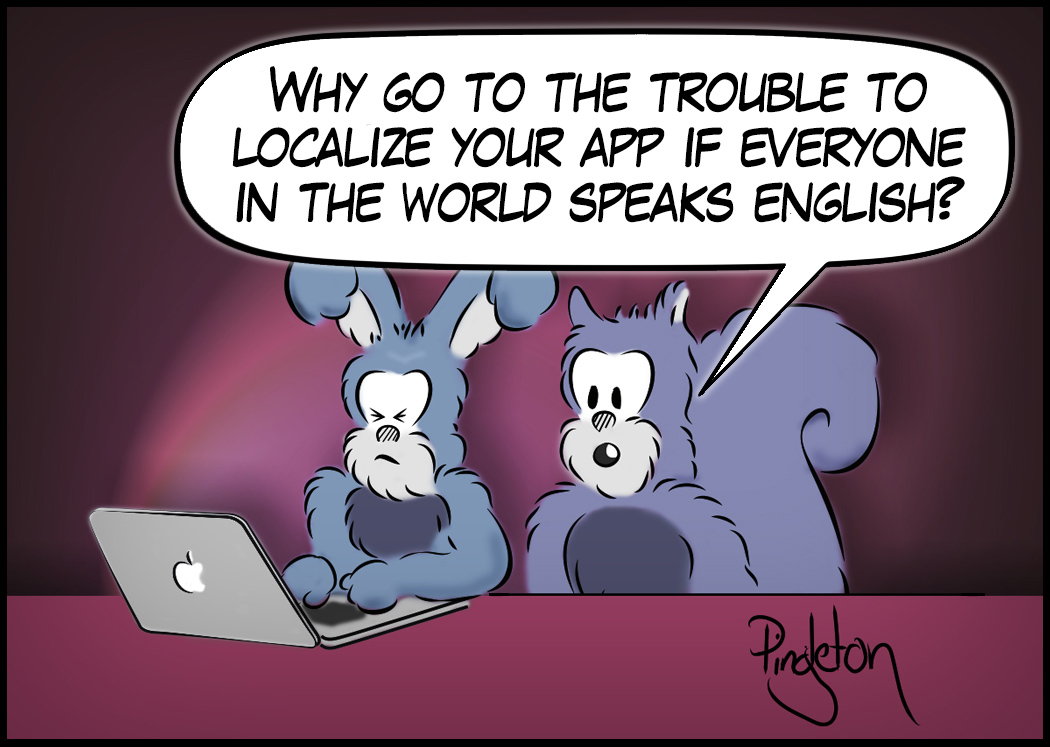As I was sitting across from a pair of marketing advisers at WWDC 2015, one of them asked, “how important do you feel localization is to your success as an iOS developer?”
I of course answered, “very important” only partially believing what I’d just said. “That’s right,” he said. “VERY important!”
That made an impression. The reason I was attending WWDC was to get advice from the those who knew Apple best — their employees. But why localization?
(Please consider following me on Twitter. Thanks!)
Localization, what is it?
First of all, what is localization? Isn’t that just another word for translation?
Translation is definitely part of it, but consider this example: our CFO Jill and I were speaking to a radio station in Scotland about our first app, Spirit Story Box, and one of the interviewers mentioned the fact that the app said, “elevator” instead of “lift.” It was one of those words that had disappointed him.
We both spoke English, but this was a difference between the US and the fine folks across the Pond. If we’d made a few changes to the UK version, the app would have been much more personal to them, and this is one of the features of localization.
Perhaps I will delve deeper into the other areas that contribute to localization in a future post.
So why localize?
So why localize? Isn’t English the most widely spoken language?
English speaking nations could be forgiven for their naiveté to some extent, but to persist in this line of reasoning is to miss an extremely big opportunity.
By some accounts the US is no longer the largest app market. Japan has taken first place. Even if they were second, consider this, how many more sales do you think you’d get if you released your app in Japanese as well? Twice as many? Maybe more?
Ever hear the tongue-in-cheek phrase, “I’m big in Japan?” Say your app is doing well in the US, what if it becomes a cult phenomenon in another country? Hey, it can happen. Jerry Lewis was big in France.
And say you receive $300 per month from the US market. What if you could duplicate that in nine other countries? You’d turn that into $3,000 per month. That’s enough money for most people to call themselves a successful app developer.
Thinking about these numbers alone were a wake up call. And so Spirit Story Box is in the process of being translated into many different languages as I write. Our next app will have support for three other languages besides English right out of the box.
Isn’t localization difficult?
“So,” I hear you ask. “Isn’t localization difficult? I don’t know a lot of languages”
It’s not really as hard as you might think. I don’t know any other language besides English. There are some great tools and resources out there. Lynda.com has an excellent course on localization titled, “Localization for Developers,” which I would suggest, especially when you are ready to hire an translator.
One amazing resource I found is the Microsoft Language Portal. What a gift from Microsoft! Say you have a phrase that you want to translate that you’re pretty sure has probably been localized in a Microsoft app or OS — let’s say the phrase “Game Over.”
Enter “Game Over” (with quotes) and set the languages to be translated from and to, and voilà! Microsoft provides you with examples of how they’ve localized that exact phrase in that target language and in which program/OS.
Killer! Seriously! Killer! Thank you Microsoft! I can’t tell you how useful this database has been, especially for asian translations.
Can I use Google to translate everything?
No…just…NO! Find a web page that is written in Japanese, and have Google translate it. Does that sound like good English to you?
To translate sentences, you will need to hire a translator. The good news is, it’s not as expensive as you might imagine and there are many web services devoted to translation.
If you use a service such as fiverr.com to hire an translator, be sure to read reviews to determine the best translator for a given language.
At the very least…
So you have an app that isn’t an easy candidate for localization. Why not create a translated description in the App Store? This will still help you market your app to English speakers in other countries.
Summary
The bottom line is, that if you’ve had only modest success as an app developer, and you aren’t localizing, you’re missing potential profits. I translated Spirit Story Box, an app with over a 2000 word vocabulary, into German in one day.
Yes, there are other issues besides translating words. You need to consider currency, date and time formats, and you may need to learn a little about Unicode (at least UTF-8), but the pay-off is worth your investment.
